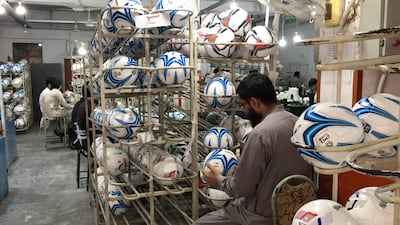Among the hundreds of millions of fans watching the Fifa World Cup in Qatar, few realise that Pakistan is a key player in football's most prestigious tournament even though its national team has never taken part.
As in the 2014 World Cup in Brazil and the 2018 tournament in Russia, a large number of the footballs used in Qatar are made in Sialkot, a city in Pakistan’s eastern province of Punjab.
The Pakistani men’s national team ranks a lowly 194 out of 211 teams, while the women’s team is placed at 160 out of 187, but when it comes to making footballs, Pakistan is the world champion.
More than 70 per cent of the world’s football supply comes from Sialkot, according to Business Insider magazine. Pakistan’s most populous city is home to many craftsmen and industries known for making other sporting goods as well, including cricket balls, cricket bats, volleyballs and gloves.
Fifa awarded the contract for the 2022 World Cup footballs to Forward Sports, a manufacturer in Sialkot that also supplied the two previous tournaments, and to another company in China.
All the World Cup footballs from Sialkot are made by Forward Sports, which has grown from having one room and about 20 employees to a multinational with operations in Dubai, Egypt and China and 6,000 employees, including 2,000 women.
Providing the official World Cup football “is always a dream for any manufacturer”, says Forward Sports' chief executive, Khawaja Masood Akhtar.
“It’s a big achievement and honour for me as well as for the whole country that Pakistan has made items used in such a big event,” Mr Akhtar said.
Footballs from each World Cup — in pictures















There are two versions of the 2022 World Cup football being produced — one that is used in the matches and another, less expensive version, that is sold to fans. According to Mr Akhtar, the match balls have extra layers and are made with more care.
“For the current World Cup our company has 35 per cent share of the match balls and about 70 per cent of the balls for the open market,” Mr Akhtar said.
He said Fifa ordered 300,000 of the 'Al Rihla' (meaning journey in English) footballs being used in Qatar, which together with the fan version, added up to about 10 million units being made for this World Cup.
In keeping with Qatar’s pledge to respect the environment by keeping the event carbon neutral, the Al Rihla ball is made from bio-based recycled materials and non-polluting water-based chemicals, Mr Akhtar said.
The football’s panels are attached by a process known as thermo-bonding, using a specially developed water-based glue.
“This technology was developed by Forward Sports in 2007,” Mr Akhtar said.
chief executive, Forward Sports
The company’s first match ball made with this technology was the “Finale ball" used in the Uefa Champions League final in Rome in 2009.
Staying abreast of new technology and adapting to changing needs had allowed Pakistan to compete with China for market share, Mr Akhtar said.
He cited the example of hand-stitching in making footballs, which for a long time was the only method used. But it could not keep up with market demand because even a skilled worker could make only five or six balls in a day.
“Hence, keeping the market demands in mind, we started to look for other technologies and we found that a Japanese company introduced thermo-bonding technology in 2003, but it was patented,” he said.
Because of the expense of licensing the Japanese technology, Forward Sports worked to develop its own method of making thermo-bonded balls and launched its line in 2007.
Now, “we don’t produce a single hand-stitched ball and our production, as well as employees, have doubled”, Mr Akhtar said.
He said the company hoped to contribute by providing more employment for the people of Sialkot and generating more revenue for Pakistan.
According to data from the Pakistan Bureau of Statistics, Forward Sports was among Sialkot’s top export earners in 2021-2022, accounting for $51 million of the $342 million in sports goods exported that year.












